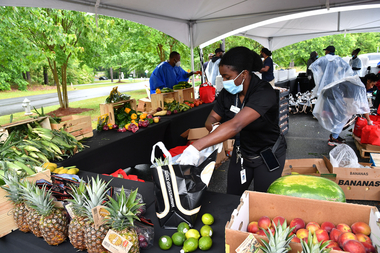Why you shouldn't be worried about getting the coronavirus from food

Health experts say there's no evidence the coronavirus can be transmitted through food.
You might have seen reports this week that Chinese authorities said a surface sample from a batch of frozen chicken wings imported from Brazil tested positive for coronavirus.
But don't panic.
Yes, the virus was detected on the food product in the Chinese city of Shenzhen, according to a statement from the municipal government. Officials did not name the brand.
But test results for people who might have had contact with the chicken wings have so far come back negative, the statement said, and tracing is underway for products from the same brand that have already been sold. Meantime, one expert said tests of the chicken might have detected genetic material from dead coronavirus, which can cause false positives.
Here's the bottom line: Doctors and health experts have repeatedly said the coronavirus is not likely to be transmitted by food.
Dr. Ian Williams, chief of the Outbreak Response and Prevention Branch of the US Centers for Disease Control and Prevention, which investigates foodborne and waterborne illnesses, previously said there was no evidence that Covid-19 is "foodborne-driven or food service-driven."
"This really is respiratory, person-to-person," Williams said. "At this point there is no evidence really pointing us towards food (or) food service as ways that are driving the epidemic."
Covid-19 is largely spread through respiratory droplets when an infected person coughs, sneezes, or talks when they're within 6 feet of another person, according to the CDC. The best ways to prevent the spread is by social distancing, wearing a mask, thoroughly washing your hands and covering a cough or sneeze.
Williams' point was reiterated more recently by the US Food and Drug Administration and the US Department of Agriculture, which said in a joint statement in June there is "no evidence" people can contract the virus from food or food packaging.
Now, per the CDC, it is possible you could get Covid-19 by touching a contaminated surface, including food packaging, and then touching your face. But you can reduce the risk by washing your hands with soap and water for at least 20 seconds after handling food packaging.
Unlikely virus will persist after shipping, WHO says
International experts also seem to agree.
"People should not fear food or food packaging or the processing or delivery of food," Dr. Michael Ryan, the executive director of the World Health Organization's Health Emergencies Programme, said Thursday.
"I would hate to think that we would create an impression that there's a problem with our food or there's a problem with our food chains," he said. "There is no evidence that food or the food chain is participating in transmission of this virus, and people should feel comfortable and feel safe."
The WHO previously said it is "highly unlikely that people can contract COVID-19 from food or food packaging," reiterating Covid-19 is a respiratory illness primarily spread person-to-person.
Additionally, it's unlikely the coronavirus would be transmitted through goods manufactured elsewhere, per the WHO.
"Even though the new coronavirus can stay on surfaces for a few hours or up to several days (depending on the type of surface), it is very unlikely that the virus will persist on a surface after being moved, traveled, and exposed to different conditions and temperatures," the WHO said.
If you're still uneasy, know that your body has another line of defense.
Even if the coronavirus got into your food, your stomach acid would kill it, according to Dr. Angela Rasmussen, a virologist at Columbia University.
"When you eat any kind of food, whether it be hot or cold, that food is going to go straight down into your stomach, where there's a high acidity, low-pH environment that will inactivate the virus," she said.
In the case of the chicken wings in Shenzhen, David Hui Shu-cheong, a respiratory medicine expert at the University of Hong Kong, said they were likely contaminated during packaging. But that doesn't necessarily mean they're infectious.
The tests could be picking up the RNA -- the genetic material -- of dead coronavirus, he said, which has been known to cause false positive results in patients who have recovered from Covid-19.
By Dakin Andone, CNN via The-CNN-Wire™ & © 2020 Cable News Network, Inc., a WarnerMedia Company. All rights reserved.
The Gayly.8/13/2020 @ 4:33 p.m. CST.





